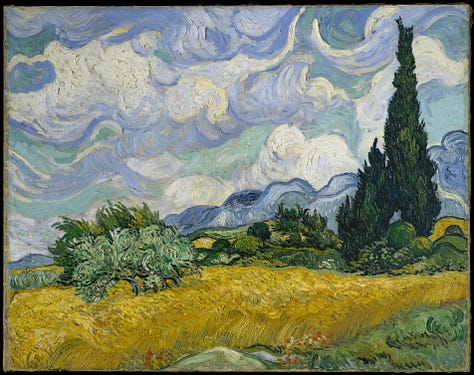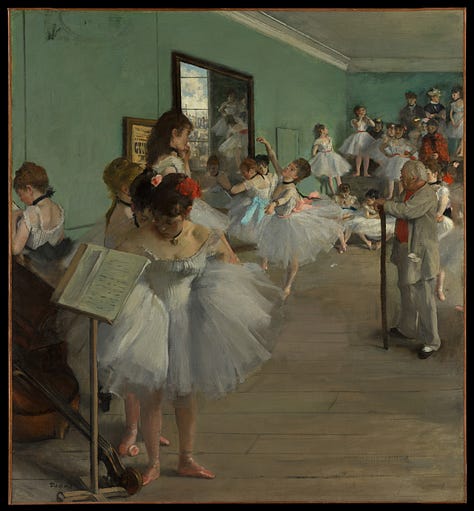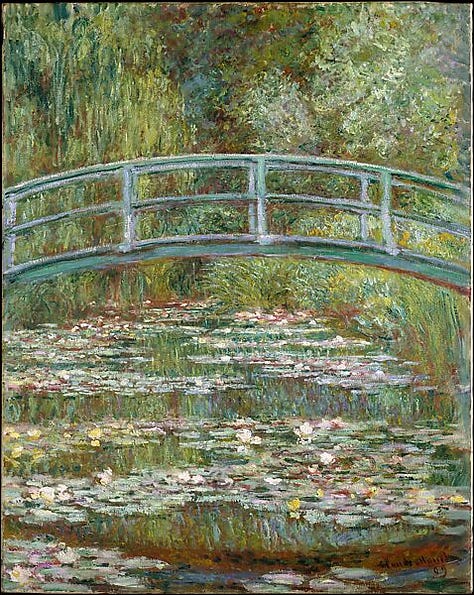I love art museums. Growing up in New York City, the MET was the museum to visit.
Enduring long trips of stop-and-go-wobbly bus rides, trapped with peers and social anxiety, were worth it for a visit to the MET (the Metropolitan Museum of Art). I’d skip up the stairs as fast as I could, to reach the grand colonnaded entrance on top. I just wanted to get inside, get lost, and let my curiosity guide me as I wandered from painting to painting, gallery to gallery.
I’d get swept into the middle of Van Gogh’s, “Wheat Field with Cypresses,” feeling the wind roll over my skin as the shoulder-high grasses brush against me. I’d ruffle my skirt, straighten my back and stretch my legs, pretending to be one of the ballerinas warming up for “The Dance Class,” by Degas. I’d stand on Monet’s “Bridge over a Pond of Water Lilies,” taking in the sweet dewy scent of a cool spring morning, while leaning over the railing to stare at my reflection in the water. The art brought me to new places in my imagination.



I always knew I wanted to be some sort of artist. But I didn’t think I could “make it” professionally. So instead, I chose a “practical” creative career: architecture.
While visiting the MET in college, I started to take breaks from viewing the art to admire the architecture that cradled it. I noticed that the interior design styles varied from gallery to gallery. Some galleries were traditional, some were modern. Some were large with windows, while others were small, dark and cozy.
Then it hit me: the galleries were designed to create a more immersive experience for the viewer. For example, the “Temple of Dendur” is in a large open room, with huge windows facing Central Park. The combination of the sand-colored stone, and the natural light offered by the window mimicked the temple’s original setting of the blistering-hot desert.
Another example is in the European Painting Galleries. These rooms are small and dimly lit. The gold ornate framed paintings pop against the dark, muted colored walls. The parquet wood floors are worn in and the walls are trimmed with ornate wainscoting. These galleries emulate the vibes of the historic homes or churches where these paintings originally lived.
Visiting the MET is not just about viewing an artist's work as a visual experience. It’s a physical and mental immersion into the universe created by the combination of the artist and the museum. Attempting to stand in the artist’s shoes, I press play on the paused moment they captured in time, and experience the scene they’ve created for us.
Thank you Sandra Yvonne for your valuable feedback on this essay (and Title suggestion).








Speaking to my soul, Elizabeth. We share a similar aesthetic. The paintings and rooms you selected are some of my favourites too. I would spend hours here happily. I was a walk away, however, not a bus ride.
Later, I would bring my kids here. They loved the armory section downstairs, and the greek statues and the American Garden.
“Attempting to stand in the artist’s shoes, I press play on the paused moment they captured in time, and experience the scene they’ve created for us.”
*chefs kiss*
Like Van Gogh, Degas, and Monet, you’re a skilled painter with both, paint and words, giving us a vivid portrait of the MET and the immersive experience within it.
& channeling your best Patti Smith, we love to see it.
Now take me to the MET!